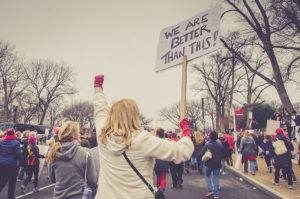You Too: White Feminists Err in Co-opting Protests of Racism
 Photo by Jerry Kiesewetter on Unsplash
Photo by Jerry Kiesewetter on Unsplash It’s been one year since the #MeToo movement took full flight, and in that time feminists have certainly been speaking up, most recently during Brett Kavanaugh’s Supreme Court hearings. Some feminists have co-opted other forms of protest for new purposes.
Molly Ringwald, a white American actress known primarily for her roles in ‘80s teen movies like The Breakfast Club, invoked the “take a knee” movement in a recent tweet:
I am calling on either Beyonce, Ariana Grande or Christine Aguilera to sing the National Anthem on bended knee #JustDoIt
In 2016, NFL player Colin Kaepernick began kneeling during the national anthem to protest police brutality against people of color. While calling for women to do the same in the name of survivors of sexual assault was supposed to be in good faith, it flopped. This is a prime example of co-opting something that doesn’t belong to you and using it to your own benefit. This isn’t to say that white women shouldn’t protest. They certainly should, but not by using an action that protests something they’ve been absent in supporting.
The same thing happened with the #MeToo movement in and of itself. Tarana Burke created the “Me Too” campaign in 2007 and was left generally unsupported by prominent white feminists. It wasn’t until 2017 that #MeToo was popularized into a hashtag when actress Alyssa Milano tweeted about it amid the sexual assault allegations against Harvey Weinstein. Milano did not give credit to Burke initially because she was unaware of Burke’s role, but she made sure to credit her a few days later in a TV interview. This incident sheds light on the disparity in how women of color (WOC) are received, silenced, or even erased when they report abuse.
Recently, actress Bette Midler tweeted that “Women, are the n-word of the world,” referring to a song written by John Lennon and Yoko Ono in the 1970s. This statement completely ignores the existence of black women by separating race from gender, and centralizing whiteness. She went on to defend herself by referring to the FBI’s refusal to fully investigate Dr. Christine Blasey Ford’s allegations of sexual abuse against Kavanaugh. “SEE WHAT I MEAN??” she tweeted.
Although they are oppressed, there’s no need to appropriate racism when it comes to the plight of white women. White women will never be treated like people of color. Sexism and racism are two different experiences (and some of us unfortunately experience both).
White women have been historically complicit in other ways, too. They helped pillage and even kill indigenous people. They upheld Jim Crow laws. They voted for Donald Trump. They called the police. They voted to confirm Kavanaugh. In the highest court of the land, they even think taking a knee is “dumb and disrespectful.”
There’s certainly a problem with white women’s allegiance to white supremacy and patriarchy. Perhaps it’s the proximity to both, but it has nonetheless crept into feminism and needs to be addressed.
As we all know, Kavanaugh’s confirmation was a direct blow to the #MeToo movement. His raging and emotional disposition during his testimony let us know that he feared losing power. If you can’t tell by now, white patriarchy is self-serving. Whiteness can no longer save white women. It’s time for white women who practice inclusive feminism to teach others to do the same. De-centralize whiteness. Vote women and people of color into office. Correct your peers who perpetuate white supremacist patriarchal ideals. If we are to be feminists, we must advocate for women of all intersections. When we do this and stand with women in solidarity, we can further dismantle the white supremacist patriarchy.
